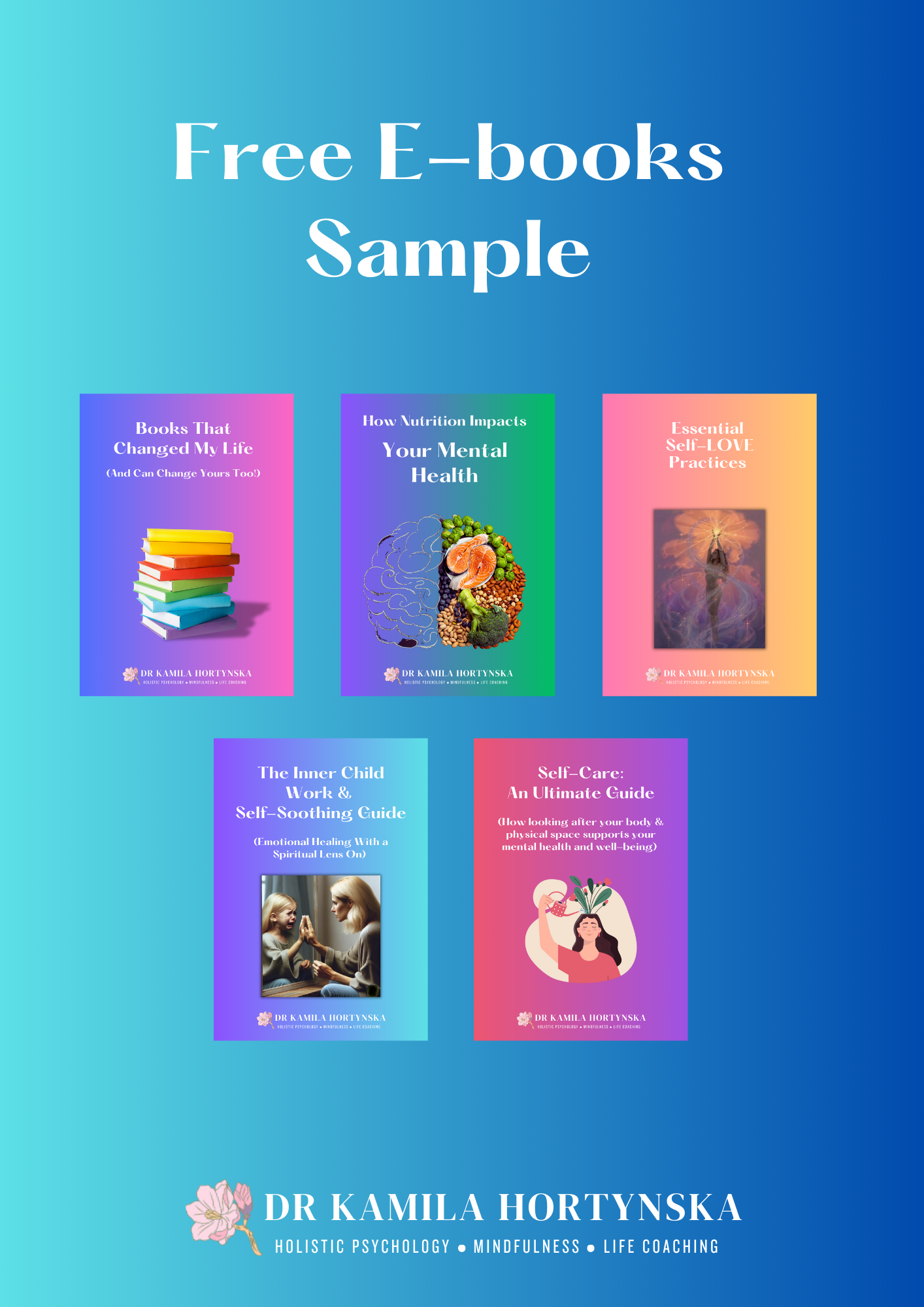A holistic approach to mental health looks at the entirety of your being – your thoughts, feelings, body, and spirit. Holistic psychology explores ways for your body, mind, and spirit to work in harmony to bring peace, gratitude, and self-healing into your future. Rather than addressing a single problem, holistic psychology or holistic therapy looks at the body as one entity to help people heal and thrive on a much deeper level.

The word psychology translates as the “Study of the Soul” – therefore, in holistic psychology, we take that step a little deeper and help you transform into your true authentic self. To connect with your Soul.
Working with a holistic psychologist or holistic life coach involves healing on many levels. This approach can use CBT, Breathwork, different psychological therapy approaches, and guided imagery, to explore and transform your Consciousness, rather than merely changing your thought patterns or behaviours.
Holistic psychology or holistic therapy is an integrative approach that mixes traditional and non-traditional treatments to help you feel balanced. Similarly, holistic medicine addresses the whole human (body, mind, and spirit), looking beyond the physical issues to heal the entire body. This whole-body approach is a long-term solution to developing a healthy lifestyle.
Is this a new approach?

Not at all. However, it is coming into its own as more people open their minds and are ready to explore their true selves. In the twentieth century, the Greek Physician Hippocrates (now known as “The Father of Modern Medicine”) explored the idea that several aspects of the body work together to create equilibrium. Therefore focusing on changing just one part of your life will not make a balanced future or help you reach the goals you wish or the future you are destined for. You need to look at the whole of you.
The holistic psychologist approach
The goal of a holistic approach is to balance the complex aspects of a person—the keyword you need to think about here is balance.
The traditional medical approach to healthcare treats areas of the body or mind as separate entities. But in reality, they are completely intertwined and cannot be separated.
Traditional psychology looks mainly at the mind and emotions. Holistic psychology looks at all four aspects: body, emotions, spirit and mind.
To feel fully supported in your holistic health journey, I recommend the following:
- Look after your physical body, including your hormones and nervous system.
- Cultivate positive relationships and active dialogue with your spirit, your heart, your intuition, and higher self so that you feel your life has a meaning and purpose
- Keep upgrading your operating system (your brain and logical mind), so that it serves you well in completing your projects and adventures, rather than keeping you in the ‘survival’ mode of fight or flight.
- Invest time in developing self-soothing, grounding and emotion-regulation techniques so that your moods don’t hijack your days.

The holistic practice is so broad that it can be adapted and modified for the individual experience.You can start your holistic health journey by combining various techniques to create a personalised route to self-improvement. Multiple approaches can be incorporated into holistic practice depending on a practitioner, their experience and training.
I draw on the following approaches in my Holistic Psychologist practice, either personally or by referring to relevant specialists:
- Traditional talking therapy you might associate with psychotherapy
- Meditation and Mindfulness
- Good Nutrition and relevant insights from Functional Medicine
- Breathwork or breath therapy
- Massage or self-massage
- Yoga, Tai Chi, Qi Gong
- Therapeutic movement, Dance Therapy, Exercise
- Sound Therapy
- Recall Healing
In a traditional Western medical approach, someone with hip pain would be treated by a hip specialist who might address their hip issues with medicines and potentially other interventions such as surgery. What if your acute leg pain affected your mental health and ultimately caused depression? Acute pain can affect our mental, emotional and spiritual capabilities, so it makes sense to look at the body as one. A holistic approach looks at more than just the pain. A person’s mental health, attitudes to the illness, spiritual views, lifestyle, movement patterns, nutrition, and much more would be taken into account and treated with the same importance as hip pain alone.
Similarly, when a person with depression or anxiety comes to see a traditional psychologist, it is most likely they would focus on their thoughts and emotions and the impact of the social environment and life circumstances on their condition.

A Holistic Psychologist would additionally address body and spirit aspects of their problem and may for example ask them about their diet since gut health is fundamental for good mental health and too much sugar in the person’s diet can make a person more prone to panic attacks, irritability and worrying. A holistic approach would also incorporate looking at a deeper meaning of someone’s symptoms and life events since depression may also be seen as a message from the unconscious, Higher Self, or Soul if you like, that a person needs to change the course of their life. Looking at it this way, depression is a way to stop someone in their tracks so that they can reflect on their values and aspirations and life goals and make appropriate changes to start living a happy and fulfilled life in agreement with their True Self.
A new direction for our health
So why this shift to a whole-body approach?
A holistic approach is still quite revolutionary in psychology but is likely to become mainstream very soon because it is empowering.
A holistic psychology approach promotes practical tools for self-healing. A holistic psychologist helps you understand how your beliefs, lifestyle, and even food choices directly affect your mood (as well as your confidence to create the life you want).

Did you know that your mental health and physical health are inextricably linked? According to the World Health Organization, treating mental health is an integral and essential part of treating a person’s overall health. As a result, we can see a new pattern of those working in the healthcare field placing a conscious awareness of the mind-body connection at the centre of their interventions to offer full-body care to their clients.
What are the benefits of a whole-body, whole-person holistic approach?
A holistic approach focuses on a person\’s overall sense of wellness, not just their illness or condition.
Well-being isn’t just about being happy, successful, or in good physical health. It is about a combination of our love for what we do each day, the security of our finances, the quality of our relationships, the vibrancy of our physical health, and our role and contribution to communities (Rath & Harter 2010).

Here are some benefits you might experience with a holistic approach to your health.
- Improved emotional and spiritual wellbeing
- Improved physical wellbeing
- Improved mental health
- Improved social wellbeing
- Disease prevention
If you were prescribed medication for a health issue but could enhance recovery by practising yoga and meditation to improve the symptoms, that would be a much better outcome than simply taking the tablets alone. By treating the body as a whole, we tune in with how the body, mind, and soul interact and how each needs to be balanced to live a healthy, happy life.
Who might work with a Holistic Psychologist?
Whoever feels called to it. In a holistic approach, the assumption is that you already have in you everything you need; a holistic psychologist helps to guide you along the way and helps you identify the skills you require to get to where you want to be. A range of issues can be explored. However, it can be especially beneficial when used in the treatment of:
- Anxiety
- Depression
- Mood regulation
- Stress
- Trauma
- Somatic issues
What are the benefits of working holistically?
Holistic psychology is also seen as a preventative approach rather than a curative one. It can help you learn to understand your body and mind and ways to work alongside them to create a sense of wellbeing and empowerment for years to come. Working in this way not only benefits you in the here and now, but in your whole life moving forwards.
Holistic Psychologist Leeds
If you are thinking of working with a holistic psychologist, I offer individual coaching sessions for;
- People who feel stuck, confused, or close to burnout.
- People who know there’s a happier, healthier version of them just waiting to be unleashed
- People who crave more clarity, purpose, and a deeper meaning in their life.
- People who have high-flying jobs but aren’t fulfilled
You can view my pricing here and read testimonials here. You can also read more about my transformation journey, which might help you decide whether we are the right fit.
You are reading this for a reason, so perhaps it\’s the right time to go ahead and book a session with me using the button below:


